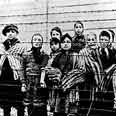
Rabbi, is it okay to eat human flesh?
CD containing halachic, moral questions raised before rabbis by Jews during Holocaust revealed for first time Tuesday. Among other things, rabbis ruled that use of medications produced by Nazis after experimenting on Jews was forbidden because of fear of desecration of dead
A CD containing the dilemmas was revealed for the first time Tuesday. It was produced by the Claims Conference (an organization representing global Jewry on issues of reparations against Germany and Austria) in association with Bar-Ilan University and the Netivei Halacha institute.
The different issues that rabbis had to answer dealt mainly with halachic questions that Jews had to face during the Holocaust, but also provide a view to the difficult moral dilemmas they had to contend with on a daily basis.
One example is the question of whether a Jew can use medications produced by the Nazis after experimenting on Jewish people. Rabbis determined at the time that despite it being a medication, one cannot make use of a person who was killed and therefore using this medication is forbidden and is considered desecration of the dead.
As far as consuming human flesh in situations of famine, which was the general condition in ghettos and concentration camps, the rabbis' instruction was that it is permitted only if it saves lives, but the general notion was that one should not resort to it as one would lose human character.
One of the issues featured in the CD is a case in which a father and son were beaten up by a German soldier. The soldier told the child that if he gave him the gold watch he was wearing he would have mercy on the father and would kill him with a gunshot without torturing him. The child handed his watch to the German soldier and "in exchange" the solder shot and killed the father.
'Marriage ceremony during wartime unadvisable'
After the war, the child suffered greatly from pangs of conscience over the event and asked rabbis for advice. Following long deliberations, the rabbis ruled that the child lived in an impossible reality of chaos, as they called it, and therefore his action was acceptable. The rabbis did recommend, however, that he should busy himself with charity in order to purify himself of the emotions of guilt he was surrounded by.
A question that many Jews asked during the Holocaust was whether it is allowed to get married at a time of war. Rabbis determined at the time that holding a marriage ceremony during wartime is unadvisable since many women could remain "agunot" (women who are bound in marriage to husbands that are missing or not proven dead). Additionally, rabbis said that single women could hide or better integrate in labor camps and therefore save their lives.
Zvi Inbar, member of the Claims Conference, said on Tuesday before launching the CD: "We are happy for the opportunity to support and advance a first rate and important issue in perpetuating the Holocaust while stressing the withstanding of the spirit of the Jewish people during these difficult times. This unique collection, revealed for the first time after many years of effort, is an historic document with immense importance to endow on future generations."










